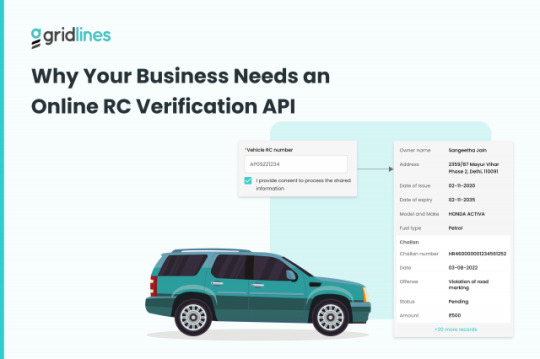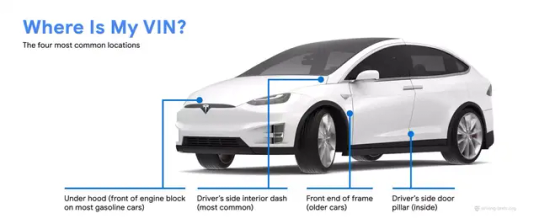#VehicleVerification
Explore tagged Tumblr posts
Text

Discover how Online RC Verification APIs simplify vehicle registration checks, boost compliance, and enable faster customer onboarding. Ideal for fintech, insurance, and logistics sectors, these APIs provide real-time access to verified vehicle data, reducing fraud and streamlining digital operations
0 notes
Text
Deciphering the Automotive Code: The Vital Role of VINs in Vehicle Transparency

In the automotive world, there's a silent yet powerful tool that plays a crucial role in maintaining transparency and authenticity – the Vehicle Identification Number (VIN). This article aims to unravel the significance of the VIN and highlight the vital function of VIN decoder services in shedding light on a vehicle's untold history.
The VIN, a 17-character alphanumeric code, is essentially the identity card of a vehicle. Unlike a registration plate, which can change over time, the VIN is a constant identifier throughout the vehicle’s life. Each character in the VIN holds specific information about the vehicle, from its manufacturing location to its unique serial number. This system, standardized in 1981, ensures a uniform method of tracking vehicles globally.
Understanding a vehicle's VIN is crucial, especially in the used car market, where a vehicle's history is as important as its mechanical condition. A detailed VIN report can reveal a wealth of information, including prior accidents, service history, and even whether it was ever reported stolen. This is where services like VIN check become invaluable. They offer an easy-to-use platform for prospective buyers and sellers to access detailed VIN reports, ensuring informed decisions are made during transactions.
The process is straightforward: enter the VIN on the service’s website, and within moments, a detailed history report is generated. This transparency is not just beneficial for buyers and sellers; it is also crucial for insurance companies and law enforcement agencies, offering a reliable method to authenticate the history and legality of a vehicle.
In essence, the VIN is more than just a series of letters and numbers stamped on a vehicle. It's a gateway to understanding the life story of a car, truck, or motorcycle. It provides a level of security and peace of mind for all parties involved in the vehicle's lifecycle. With the aid of VIN decoder services, the complex code is transformed into a clear, comprehensive history, offering a glimpse into the journey of every vehicle.
#VINLookup#VehicleHistory#CarIdentity#AutomotiveTransparency#VehicleInsights#UsedCarChecks#AutoIdentity#CarHistoryReport#VehicleVerification#AutoDataDecoder
0 notes
Text
How Online RC Verification APIs Are Transforming Vehicle Ownership Checks
In today’s fast-paced digital landscape, verifying vehicle ownership has become essential for businesses operating in sectors like fintech, insurance, logistics, car rentals, and vehicle financing. Traditional RC (Registration Certificate) verification processes are slow, manual, and often prone to errors or fraud. This is where Online RC Verification APIs step in as game changers.
Let��s explore how an RC Verification API like the one offered by Gridlines is simplifying workflows, ensuring regulatory compliance, and improving customer experience across industries.
What is RC Verification?
RC (Registration Certificate) is an official document issued by the RTO (Regional Transport Office) that certifies the ownership of a motor vehicle. Verifying this document is critical in scenarios like:
Vehicle loan disbursals
Car/bike rental sign-ups
Logistics fleet onboarding
Motor insurance issuance
Second-hand vehicle marketplaces
Manual verification of RC details can take hours or days. This delay not only impacts business efficiency but also increases the risk of onboarding fraudulent vehicles.
The Rise of Online RC Verification APIs
An Online RC Verification API allows businesses to verify vehicle registration details instantly using the vehicle registration number. With seamless integration into mobile apps or platforms, it fetches real-time data directly from government-authorized sources like Vahan.
Key details typically verified via the API include:
Owner’s name
Vehicle class and fuel type
Registration date
Engine and chassis number (partially masked)
RC status (active/scrapped/expired)
Key Benefits of RC Verification APIs
Instant Results: No more waiting for manual checks. Get verified RC data within seconds.
Compliance Made Easy: Stay aligned with KYC/AML regulations and onboarding protocols.
Reduced Fraud Risk: Ensure vehicle authenticity and detect tampering or forged documents.
Seamless Digital Journeys: Integrate into your existing app, platform, or CRM with minimal code.
Scalable for All Sizes: Whether you’re a startup or enterprise, APIs scale with your needs.
Industries Benefiting from RC Verification APIs
Fintech & NBFCs: Speed up vehicle loan approvals by verifying ownership in real-time.
Insurance Providers: Quickly validate vehicle details before policy issuance.
Car Rental & Leasing: Ensure accurate owner data to prevent misuse or theft.
Logistics & Fleet Management: Onboard new vehicles into your fleet efficiently.
Why Gridlines RC Verification API?
Gridlines offers a robust, secure, and developer-friendly RC Verification API. It provides high uptime, lightning-fast responses, and access to reliable data from official sources. With clear documentation and dedicated support, Gridlines ensures a hassle-free integration experience.
Whether you're a fintech app aiming to reduce turnaround times or an auto marketplace that needs to verify listings, Gridlines’ RC Verification API empowers your platform with the tools you need to build trust and scale faster.
Final Thoughts
In an era where speed, accuracy, and compliance are paramount, Online RC Verification APIs are indispensable tools. By automating and securing the vehicle verification process, businesses can deliver faster services, build credibility, and reduce risk.
#RCVerificationAPI#VehicleVerification#DigitalOnboarding#GridlinesAPI#FleetManagement#APIIntegration#VehicleData#FintechSolutions#OnlineKYC#RegTech
0 notes